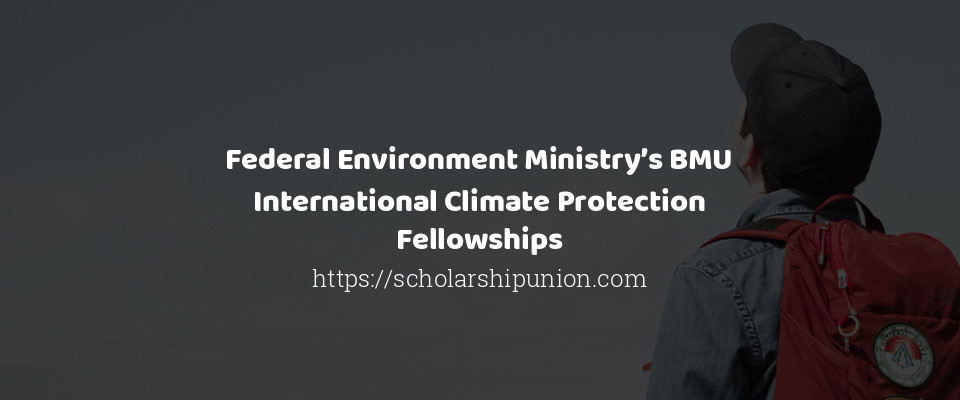Federal Environment Ministry’s BMU International Climate Protection Fellowships

Summary
Introduction
Federal Environment Ministry’s (BMU) International Climate Initiative is inviting applications for International Climate Protection Fellowships for the year 2020. Up to 20 fellowships are available for young climate experts from developing countries in Germany.
The fellowship allows future leaders to spend a year in Germany working on a research-based project of their own choice in the field of climate protection and climate-related resource conservation.
Subscribe to our newsletter
Join us today and receive the best curated news, freebies and resources directly to your inbox every week!
No spam ever, unsubscribe at any time. Check out our Privacy Policy.
Benefits
- A monthly fellowship of between €2,150 and €2,650, depending on your qualifications
- Individual mentoring during your stay in Germany
- Additional financial support for items such as family members accompanying you, travel expenses or a German language course
- A three-week introductory phase, during which you will have the opportunity to make contact with other climate protection fellows and visit companies, research institutions and cultural events in Germany
- Extensive alumni sponsorship, particularly to help you sustain contact with collaborative partners in Germany during your entire professional career
Eligibility
- Eligible Countries: Prospective leaders from the following non-European threshold and developing countries may apply for research fellowship: List of Countries: Afghanistan, Ecuador, Madagascar, Samoa, Algeria Egypt, Malawi, Sao Tomé and Príncipe, Angola, El Salvador, Malaysia, Senegal, Antigua and Barbuda, Equatorial Guinea, Maldives, Seychelles, Argentina, Eritrea, Mali, Sierra Leone, Ethiopia, Marshall Islands, Solomon Islands, Mauritania, Somalia, Bangladesh, Mauritius, South Africa, Belize, Fiji, Mexico, South Sudan, Benin, Micronesia, Fed. States, Sri Lanka, Bhutan, Gabon, Morocco, St. Kitts and Nevis, Bolivia, Gambia, Mongolia, St. Lucia, Botswana, Ghana, Mozambique, St. Vincent and Brazil, Grenada, Myanmar, the Grenadines, Burkina Faso, Guatemala, Sudan, Burundi, Guinea, Suriname Guinea-Bissau, Namibia, Swaziland ,Guyana, Nauru, Syria, Cambodia, Nepal, Cameroon, Nicaragua, Cape Verde, Haiti, Niger, Tajikistan, Central African Republic, Honduras, Nigeria, Tanzania, Chad, Niue, Thailand, Chile, India, Timor-Leste China, PR of Indonesia, Togo, Colombia, Iran, Pakistan, Tonga, Comoros, Iraq, Palestinian territories, Tunisia, Congo, Dem. Rep. of Palau, Turkmenistan, Congo, Rep. of the Panama, Tuvalu, Cook Islands, Jamaica, Papua New Guinea, Costa Rica, Jordan, Paraguay, Cote d’Ivoire, Peru, Uganda, Cuba, Kazakhstan, Philippines, Uruguay, Kenya, Uzbekistan, Kiribati, Dominica, Korea, Dem. PR of Rwanda, Dominican Republic ,Kyrgyzstan, Vanuatu, Djibouti ,Venezuela, Laos, Vietnam Lesotho, Lebanon, Yemen, Liberia, Libya, Zambia, Zimbabwe
- Entrance Requirements: Those applying for this programme must be working in the field of climate protection or climate-related resource conservation; they should have proven leadership skills, which must be convincingly demonstrated in the application and supported by appropriate references. In addition to applicants with a background in the natural and engineering sciences, candidates who have been engaged in legal, economic, health-related and societal issues relating to climate change are encouraged to apply for this programme. Application requirements:
- First university degree (Bachelor’s or equivalent), completed less than 12 years previously, counting back from the end of the application period
- Leadership skills demonstrated by initial experience in leadership positions and/or appropriate references
- Extensive work experience (at least 48 months at the time of application) or a successfully completed doctorate in the field of climate protection or climate-related resource conservation as of: 09/2016
- Scientific publications (for post-doctoral applicants) in peer-reviewed journals according to international standards
- A detailed statement by a host in Germany, including a mentoring agreement; details of the proposal must be discussed with the prospective host prior to application • Citizenship of a non-European transition or developing country (see list of countries) which is also the applicant’s habitual residence and place of work
- Very good knowledge of English and/or German, documented by appropriate language certificates
- Two expert references by individuals qualified to comment on the candidate’s professional, personal and, if applicable, academic eligibility as well as his/her leadership potential.
Others
Applicants from outside the home country will often need to meet specific English language/other language requirements in order to be able to study there.






